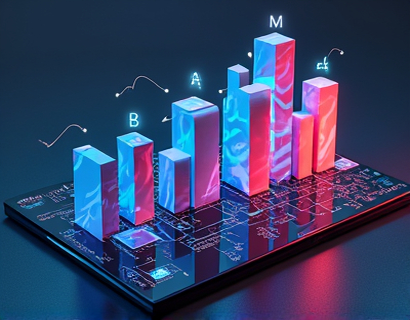Revolutionizing Data Privacy: Cutting-Edge Blockchain Solutions for Secure Partitioning and Sharing
The landscape of data privacy and security is undergoing a transformative shift with the advent of blockchain technology. This decentralized ledger system offers unprecedented levels of security, transparency, and control over data partitioning and sharing. For tech-savvy businesses and privacy-conscious individuals, blockchain presents a revolutionary solution to the ongoing challenges of data management in a digital world. This article delves into how cutting-edge blockchain solutions are redefining data privacy and security, providing precise control over data partitioning and sharing, and optimizing efficiency on decentralized platforms.
Understanding the Need for Advanced Data Privacy Solutions
In an era where data breaches and cyber threats are rampant, the demand for robust data privacy solutions has never been greater. Traditional data management systems often fall short in providing the level of security and control required by modern businesses and individuals. The centralized nature of these systems makes them vulnerable to single points of failure and unauthorized access. Blockchain technology, with its decentralized and immutable ledger, offers a promising alternative.
Blockchain's inherent characteristics, such as transparency, immutability, and decentralization, make it an ideal candidate for enhancing data privacy. By leveraging these features, organizations can achieve a higher degree of control over their data, ensuring that it is only accessible to authorized parties and remains tamper-proof.
Blockchain for Secure Data Partitioning
One of the key challenges in data management is the need to partition data securely while maintaining its integrity and accessibility. Blockchain technology addresses this by enabling precise and controlled partitioning of data. Each partition can be encrypted and stored across multiple nodes in the network, ensuring that no single entity has access to the entire dataset.
Smart contracts, self-executing contracts with the terms directly written into code, play a crucial role in this process. They can automate the rules for data access and sharing, ensuring that only authorized users can access specific partitions. This not only enhances security but also streamlines the data management process, reducing administrative overhead.
Immutable and Transparent Data Partitioning
The immutability of blockchain ensures that once data is partitioned and recorded, it cannot be altered or deleted without detection. This feature is particularly valuable for maintaining the integrity of sensitive information. Transparency, on the other hand, allows all parties involved to verify the authenticity and integrity of the data, fostering trust among collaborators.
For instance, in a healthcare setting, patient records can be partitioned and stored across multiple nodes, with each node holding a part of the encrypted record. Patients can grant access to specific partitions to healthcare providers, ensuring that only the necessary information is shared while maintaining the overall privacy of the record.
Enhanced Data Sharing through Blockchain
Data sharing is a critical aspect of modern business operations, research collaborations, and government initiatives. However, traditional data sharing methods often compromise privacy and security. Blockchain technology revolutionizes data sharing by providing a secure and efficient framework.
Through blockchain, organizations can share data without revealing sensitive information. Zero-knowledge proofs, a cryptographic method, allow one party to prove to another that a statement is true without revealing any information beyond the truth of that statement. This ensures that data can be verified and used for specific purposes without exposing the underlying data.
For example, in a supply chain scenario, multiple parties need to access and verify the authenticity of products. By using blockchain, each party can verify the data related to a product's journey without accessing the entire dataset, thus maintaining the privacy of sensitive information while ensuring transparency and trust.
Decentralized Data Marketplaces
Blockchain also enables the creation of decentralized data marketplaces, where data owners can monetize their data while maintaining control over how it is used. These platforms use smart contracts to automate the buying and selling of data, ensuring that data providers are fairly compensated and that data usage complies with agreed-upon terms.
Data owners can set specific permissions and conditions for data access, such as usage limits, duration, and payment terms. This level of control not only enhances privacy but also creates new revenue streams for data providers. For instance, individuals can sell their anonymized health data to research institutions, receiving payments while keeping their personal information secure.
Challenges and Considerations
While blockchain offers significant advantages for data privacy and security, there are challenges and considerations that must be addressed. Scalability remains a key issue, as blockchain networks can struggle to handle large volumes of transactions efficiently. However, ongoing developments in blockchain technology, such as sharding and layer 2 solutions, are addressing these scalability concerns.
Another consideration is the regulatory landscape. As blockchain technology evolves, regulations around data privacy and security are also adapting. Organizations must stay informed about legal requirements and ensure their blockchain solutions comply with relevant laws and standards.
Additionally, user education is crucial. For blockchain-based data privacy solutions to be effective, users must understand how to manage their data and permissions. Providing comprehensive training and support can help overcome this barrier and maximize the benefits of these technologies.
Case Studies and Real-World Applications
Several organizations have successfully implemented blockchain solutions for data privacy and security. One notable example is a financial services firm that used blockchain to create a secure and transparent system for sharing customer data among multiple banks. By partitioning and encrypting data, the firm ensured that only authorized banks could access specific customer information, reducing the risk of data breaches and enhancing customer trust.
In the realm of research, a consortium of universities used blockchain to manage and share research data while maintaining privacy. Each research institution had control over its data partitions, and access was granted based on predefined smart contract rules. This approach facilitated collaboration while protecting sensitive research information.
Another example is a supply chain management system where multiple stakeholders used blockchain to track and verify the authenticity of products. By storing data partitions on the blockchain, each participant could verify the product's journey without accessing the entire dataset, ensuring both transparency and privacy.
Future Prospects and Innovations
The future of data privacy and security is increasingly intertwined with blockchain technology. As the technology matures, we can expect more sophisticated solutions that further enhance data control and security. One area of innovation is the integration of blockchain with other emerging technologies, such as artificial intelligence and the Internet of Things (IoT).
AI can be used to analyze and manage data more efficiently, while IoT devices can generate vast amounts of data that require secure and privacy-preserving methods for storage and sharing. Blockchain can serve as the backbone for these integrations, ensuring that data remains secure and accessible only to authorized parties.
Moreover, the development of interoperable blockchain platforms will enable seamless data sharing across different ecosystems, fostering greater collaboration and innovation. This interoperability will be crucial for creating a unified and secure data environment that benefits all stakeholders.
Conclusion
Blockchain technology is revolutionizing data privacy and security by providing precise control over data partitioning and sharing. Its decentralized, immutable, and transparent nature offers a robust framework for managing sensitive information in a way that traditional systems cannot match. For tech-savvy businesses and privacy-conscious individuals, embracing blockchain solutions can lead to enhanced security, efficiency, and trust in data management.
As the technology continues to evolve, the potential for innovation and improvement is vast. By staying informed and adapting to new developments, organizations can leverage blockchain to safeguard their data and thrive in an increasingly digital world.









































